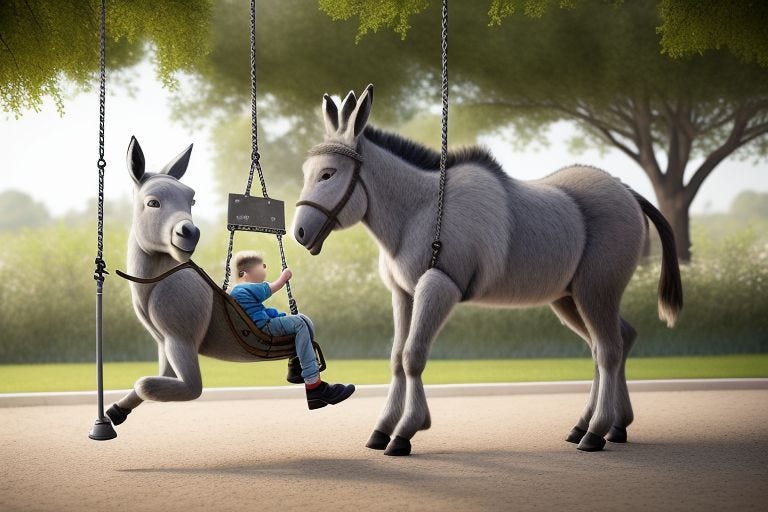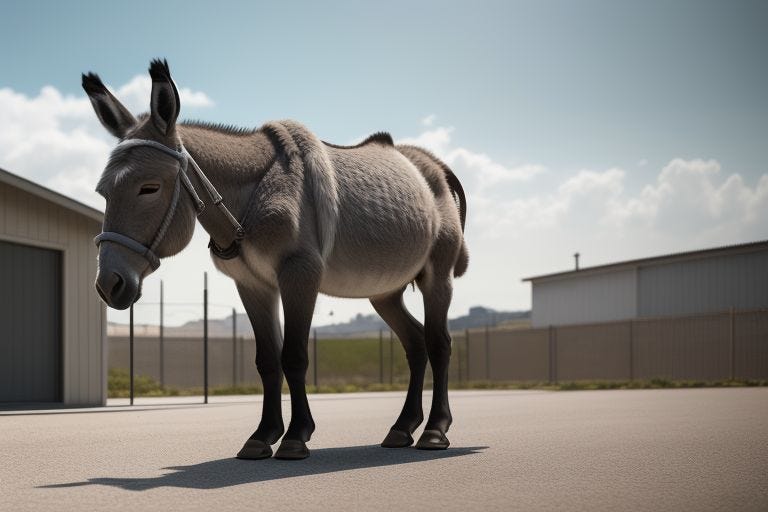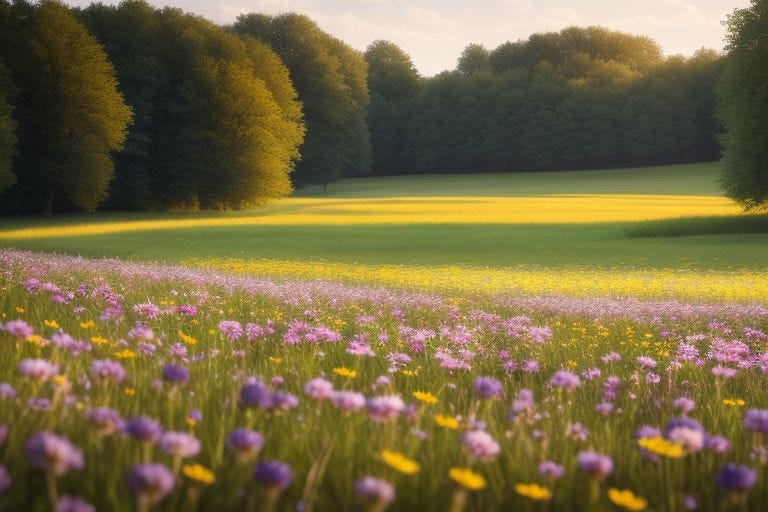The Donkey Is Not A Tiger
It doesn’t matter how I spend my days and so I spend them as if they will never run out. But of course they will. And when they do, will I be standing with my heels dug into the concrete?
Happy Friday!
And greetings from seat C46 on a train rushing north for Nature Therapy Conference 2024. (It seems like I’m always writing to you from one train carriage or another. )
For those of you new around these parts, welcome 👋
My name is David and I’m a writer, outdoor instructor and cyclist-at-large with Thighs of Steel. In this newsletter, I write stories that help you and me understand the world (and ourselves) a little better.
Sometimes I start to write an innocent story about donkeys and, before I know where I am, find myself deep in the contemplation of my own mortality.
⚠ It’s not often that I issue a content warning on my stories, but today it seems worth mentioning that about two thirds of the way down the page I start talking about how a Buddhist meditation on death might help me to live my days more meaningfully.
Hopefully you’ll find that as intriguingly useful as I did, but maybe you’ll want to skip it. Either way, and for however long you stay, welcome to edition 397.
The Donkey Is Not A Tiger 💀
Do you ever feel like a donkey? I do.
In a factory compound stands a donkey, its head lowered in that morose, stoic way that donkeys have. It doesn’t look very happy, but then it wouldn’t: it’s standing in a weird AI-generated factory compound.
The donkey has been standing on the hot, hard concrete for some time.
It’s funny because right ahead of the donkey, across the open compound not two minutes away, is a rolling meadow, full of wild flowers and those thorny thistles that donkeys love to munch.
The donkey stays put: legs planted, head down, eyes half-closed to the world.
You KNOW that the donkey would be much happier if it would only take the few trots needed to cross the compound to the meadow.
But it doesn’t.
You watch the donkey for a while and then you start to get annoyed. Come on donkey, you say, let’s go and play in the meadow!
The donkey doesn’t move. Not even the slightest flicker of an eyelash to acknowledge the hominid gesticulating before him.
In fact, the more you cajole the donkey, the more you stamp your feet and yell, the more the donkey digs his hooves into the hot, hard concrete.
You try carrots, you try sticks, you even put your shoulder to the donkey in an effort to budge him to where you know he really wants to go. Donkey doesn’t even kick out. It’s like he’s turned to concrete himself.
No matter what you do, this donkey ain’t moving.
I sometimes feel like that donkey.
I know exactly where I stand — on hot, hard concrete. I know exactly what lies a little ahead of me — a beautiful wild flower meadow. I even know that I would feel far happier with life if I simply picked up my hooves and trotted over there.
But I can’t budge. Nothing I do, yelling, pushing, shoving, cajoling, gets me anywhere. No carrot, no stick will do anything other than make me dig my heels in.
It’s pretty frustrating.
The image of the donkey helps, though. I love donkeys.
INSERT CUTE PICTURE OF A SHAGGY DONKEY, ROUGHLY NUZZLING ME WITH ITS NOSE WHILE I LIE ON A SWING SEAT IN THE EVENING SUNSHINE.

Maybe that image will stop me getting into a lather of self-loathing when I notice I’ve come over all donkey.
The donkey is not a tiger and painting stripes on the donkey will not make it roar.
Instead, I will accept the donkey: love the donkey for being the donkey and what donkey gifts the donkey brings.
Donkeydonkeydonkeydonkeydonkeydonkeydonkeydonkey. Beautifully silly word, eh?
Another thing that might help me move forward when I’m donkeying is meditation. But not any old meditation: meditation on death, or what is known in the Buddhist tradition as maranasati meditation.
Why death?
Perhaps one reason why it sometimes feels like my donkey won’t budge is because doing nothing feels safer than doing something — yes, even when the nothing is rubbish (like ugly concrete) and the something is fantastic (like pretty meadows).
In this way, I’m not valuing my existence, my experience of life on earth. I’m not fully recognising the preciousness of days and the irretrievable nature of every moment in time.
In the parlance of the existentialists, I’m in denial of my facticity: the intractable conditions of human existence, one of which is, for everyone, death.
Sometimes I let days happen to me, rather than taking an active part in them and relishing them for their fleeting individuality. In this mood, days are merely completed, marked off on the wall, rather than snatched at hungrily.
As the donkey, it feels hard to make my days joyfully and usefully busy and yet, equally, donkey me is also incapable of enjoying such un-busyness as the joyful rest it could be.
Sometimes, of course, we all feel like the donkey. That’s totally fine. That’s the individuality of that moment: it’s donkey doing donkey stuff.
In this way, the donkey is another metaphor for Katherine May’s Wintering: ‘the power of rest and retreat in difficult times’.
Spending time as a donkey is great — there are lessons to be learned and dreams to be dreamed; getting stuck as a donkey isn’t so great. Humans are not meant to languish in donkey days forever.
It’s not for nothing that, in the weeks before she died, my 96 year-old nan’s last lucid words to me were:
Do it while you can.
There is a last chance for everything. We all sicken, weaken and die. Whatever ‘it’ is, there will come a day when it’s no longer possible to do.
And this is a good thing. Life without end means days without meaning.
That’s why the donkey looks miserable, head down, eyes half-closed, staring at the concrete. The donkey imagines he is immortal and that there will always be a tomorrow when he can mosey on down to the meadow.
In moderation, there is nothing wrong with donkey days. But it’s easy for them to roll past, one into the next, on the jellied belief in one’s own immortality.
Unconsciously, I suppress my mortality and forget my nan’s last gift. It doesn’t matter then how I spend my days: I spend them as if they will never run out.
But of course they will. And when they do, will I be standing with my heels dug into the concrete?
Daily Buddhist Contemplations on Death
1. Just like everyone, I am of the nature to age. I have not gone beyond ageing.
2. Just like everyone, I am of the nature to sicken. I have not gone beyond sickness.
3. Just like everyone, I am subjected to the results of my own actions in this life. I am not free of these Karmic effects.
4. Just like everyone, I am of the nature to die. I have not gone beyond dying.
5. All that is mine, beloved and pleasing, will change, will become otherwise, will become separated from me.
~
There is SO MUCH to unpack around British / Western / South Oxfordshirsian attitudes towards mortality. Lots of you know much more than I do on the topic — I’d love to hear from you in the comments or in a reply to this email.
This is a biggie and I’m sure we all need your help!
Huge thanks to all the paying subscribers who helped make this story possible. You know who you are. I’m pouring out a tea in your honour. Thank you. 💚
If you enjoyed this one, then go ahead and tell me. It’s the only way I’ll know that I’m hitting the mark. You can tap the ❤ like button, write a comment, share the newsletter with your friends, or simply reply to this email.
Absolutely no obligation to do any of those things, but if the spirit moves you to reach out, then I’m fully here for it.
If you’re not into the whole Substack subscription thing, then you can also make a one-off, choose-your-own-contribution via PayPal. That’d make my day.
As always, thank you for your eyeballs and thanks for your support. 💚
Big love,
dc:



